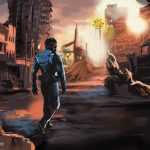Book Review | Radicalized
As climate change and capitalism rush us into any number of dystopian futures, Cory Doctorow’s new work tells the stories of people who take back the power to effect change.
Author:
18 March 2020

Dystopia is no longer just a trope in fashionable science fiction. Dystopia is the future in our present. It’s an Australia becoming uninhabitable even for fauna long adapted to extreme conditions. It’s an America where little children are caged for being born in the wrong place. It’s a UK where social security algorithms determine that a quadriplegic with no wheelchair isn’t sufficiently unfit for work to merit benefits. It’s a South Africa where miners’ lungs rot after just a few years of work.
For speculative writers, the temptation is to imagine everything that could possibly be worse than this (not much, it turns out), and make that the setting for their next future. Reading those fictional futures can often be depressing and disempowering, rather than inciting the urgent indignation the writers clearly hope for.
But here’s a revolutionary thought: what if those writers instead explored peoples’ power through action – even within dystopic conditions – to block the environmental death-cult we call capitalism?
That’s what SF writer, journalist and Electronic Frontier Foundation campaigner Cory Doctorow does in his latest work, Radicalized (Head of Zeus/Tor), a collection of four novellas. As he told one interviewer: “I think we have moved a lot of dystopian furniture onto the set. Whether we enact a dystopia around it is up to us. I believe that the future is up for grabs, that prediction is impossible and the pretense of prediction is a cynical and wicked act, because if the future is predictable then it doesn’t change based on what we do.”
Learning to fight back
The first story, Unauthorised Bread, takes on the intrusive dictatorship of bad technology – extrapolating from today’s coffee machine that won’t let you use a cloned pod to a world where the toaster oven’s algorithm determines what you eat, and then generously offers to let you buy back a morsel of freedom of choice. The Masque of the Red Death sees one of Tom Wolfe’s Masters of the Universe calling it on Armageddon, and retreating to his fortified bunker with a crew chosen on the best social Darwinist principles. In Model Minority, Doctorow explores the limits (and unthinking arrogance) of individual gestures against systemic racism – even when the actions are those of a Marvel-style superhero. As an alien from outer space, the superhero discovers he’s only contingently white himself. The title story sees armed and otherwise privileged white men crashing into an inexorable insurance company algorithmic wall barring their loved ones from medical care.
The future becomes less dystopic every time people join together and learn how to fight back. Through collective action, the apparently weak – migrant teenagers, middle-aged women, black survivors of vicious police brutality – gain strength and start laying the foundations of collective change. There’s no rosy false hope though. The book’s epigraph is something Doctorow’s parents taught him: “This isn’t the kind of fight we win; it’s the kind of fight we fight.”
Related article:
Yet this is no collection of preachy parables. For a start, it’s often laugh-out-loud funny. That’s especially true of Unauthorised Bread, as protagonist Salima uses her forensic accountant’s mind to turn her toaster into something “that took orders rather than giving them”. She has a cringe-inducing encounter with two tech bros fluent in wokewash, who are “totally energised about the possibilities of working with our customers” as they try to co-opt her as an influencer. In Model Minority, an intriguingly compromised character called Bruce pops up: he sells oppressive weaponry to governments to fund his superhero do-gooding in a bat suit. You may have met him before.
Doctorow’s characters have depth and nuance, and fighting the dystopian tide changes them. The armed white men of Radicalised feel love and loss as well as rage, even as their unchecked privilege allows them to wage terror under the radar. Graciela, the Mexican auntie in Masque, driven away from the bunker of privilege bone-sick with cholera, survives as nurse, builder and rescuer. As the rich stampede to buy isolation from Covid-19, it’s worth remembering what Doctorow told the LA Times: “The end of civilization isn’t something we should be preparing bunkers for, it’s something we should be striving to avert … The heroes of the disaster aren’t the rich dudes wetting their beds in luxury bunkers – it’s the people who get the sanitation going again.”

